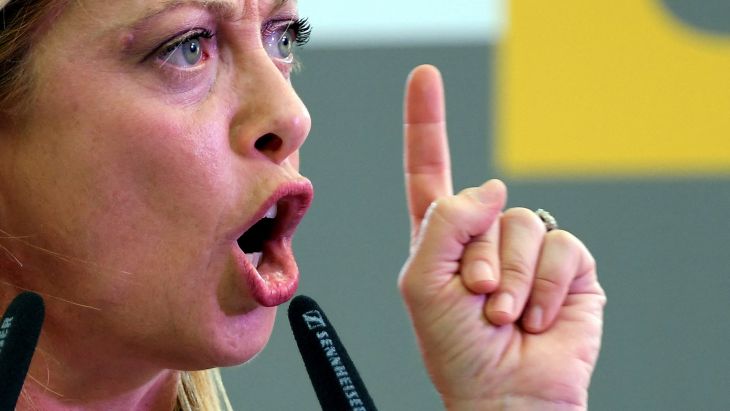Nearly a hundred years after Benito Mussolini’s march on Rome, far right leader Giorgia Meloni will become Italy’s new Prime Minister. She will lead a coalition as the most extreme right-wing leader since the late unlamented dictator and it is possible that she could introduce some potentially radical new directions to Italian domestic and foreign policies.
During her campaign, Ms. Meloni portrayed herself as a mainstream conservative.
Although she campaigned to soften her previous extremist image, the truth is that she leads a party steeped in the extreme right-wing ideology reminiscent of Mussolini’s fascist movement.
In a speech before Spain’s right-wing Vox Party earlier this year she outlined her priorities as “yes to the natural family, no to the LGBT lobby, yes to sexual identity, no to gender ideology, no to Islamist violence, yes to secure borders, no to mass migration, no to big international finance, and … no to the bureaucrats of Brussels”.
Her views coincide closely with those of Hungary’s Viktor Orban, another European extreme right-wing leader with whom she is a close friend and political ally. Some of her coalition partners have heaped praise on Russia’s Vladimir Putin and have blamed Ukraine for the war, although she herself professes to be pro Ukraine and pro-NATO.
How about her position on Europe?
On the campaign trail her motto was “Italy and Italians First”. Another slogan was “God, family, and homeland”. She called for the preservation of Italy’s Christian identity, the “traditional family”, and unbridled nationalism to meet the challenges of a globalized society in which traditional European “values” are perceived to be becoming diluted through immigration from the Islamic world and Africa.
According to a report in Al Jazeera by Virginia Pietromarchi, “critics have warned that such a vision is one of exclusion and that a Meloni-led government will be one where civil rights are at risk – especially for the gay community – where access to abortion will be restricted, and where the lives of refugees and migrants, both new arrivals and those living in Italy, will be increasingly hampered.”
At her press conferences, the fascist symbol is always in plain view. Indeed, in a recent TV interview she told the reporter to look at France and Germany where far right populist parties have been successful, and no one turned that into a scandal.
Her stated objective is to turn the European Union (EU) into a loose economic union and return to national parliaments the power to legislate according to national needs free from interference from Brussels bureaucrats. She has a lot of allies here from across the political spectrum in Europe.
“Her international allies reflect her extreme-right political vision that will make it difficult to maintain good ties with European institutions,” said Pieri Ignazi, professor of political science at Bologna University, referring to Hungary’s Viktor Orban, France’s Marine le Pen and Spain’s Vox party that hopes to win the same success in next year’s elections. “Her position is to limit the process of integration of the European Union and give back power to each nation,” he added.
Ignazi points to the refusal last week by Meloni to join the EU parliament in condemning Hungary for democratic violations. “Such protective behaviour with Orban shows an acceptance of what he did in terms of rule of law limitations and of freedom of expression,” he said.
Nationalism runs deep in many parts of Europe, and most countries are not used to absorbing migrants and adapting and expanding their cultural and religious values to incorporate those of immigrant communities. Mr. Orban’s call for a Christian Europe where nationalism is celebrated appears to appeal to many outside its borders including Ms. Meloni.
Ms. Meloni’s election victory and the strength of other European right-wing parties underscores the frustration that many there feel with a Europe that minimizes nationalism and is perceived to be creating a homogeneous society that turns its back on Europe’s Christian heritage and the individualism of each culture and its values.
Can the European Union coexist with nation states that are beginning to flex their distinctive cultural and nationalistic muscles?
Stay tuned.
Keep reading: Iran
Edición: Laura Espejo
Foro realizado en el Congreso del Estado recopiló propuestas del sector
Astrid Sánchez
